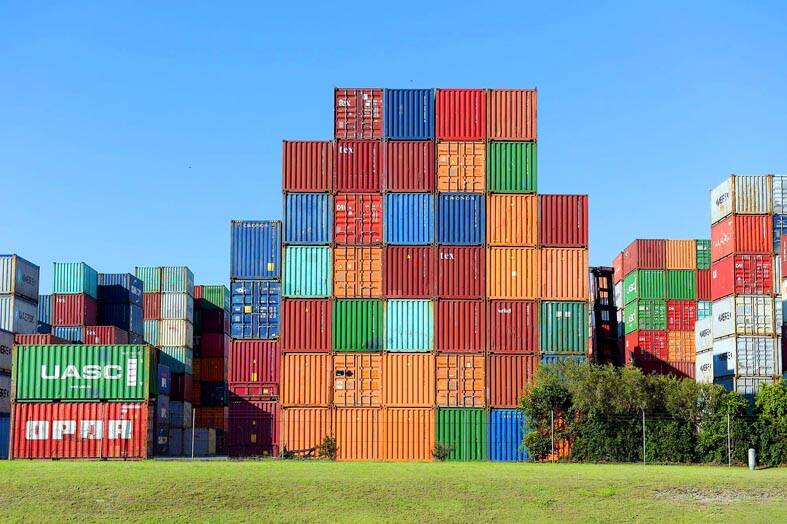Australia’s Parliament yesterday passed bilateral free trade agreements with India and the UK, leaving those partner nations to bring the deals into force.
The deals are crucial for Australia to diversify its exports from the troubled Chinese market to India and to the UK’s need to forge new bilateral trade relations since it left the EU.
The bills easily passed the Australian House of Representatives on Monday and the Australian Senate made them law yesterday.

Photo: Bloomberg
The deals need to be ratified by the respective British and Indian parliaments before they take effect. Neither nation has yet done that.
Australian Minister for Trade and Tourism Don Farrell said India had demonstrated its commitment to the bilateral economic partnership through the quality of the deal struck.
“Closer economic ties with India are a critical component of the government’s trade diversification strategy,” Farrell said.
Farrell said the British deal was “crucial to boosting our growth.”
Under the Australia-UK deal, more than 99 percent of Australian goods exports are to be duty-free, including sheep meat, beef, dairy, sugar and wine.
Taxes on 90 percent of Australian goods exported to India, including meat, wool, cotton, seafood, nuts and avocados, would also be removed.
Australian Prime Minister Anthony Albanese discussed the deals with Indian Prime Minister Narendra Modi and British Prime Minister Rishi Sunak last week on the sidelines of the G20 summit in Indonesia.
Albanese said he would visit India in March next year to advance the deal that was signed in April.
The British deal was signed in December last year by then-British prime minister Boris Johnson’s administration and has been criticized by its successors for failing to deliver more for the UK.
The deals would come into force 30 days after countries have advised each other in writing that the supporting legislation has been passed by their parliaments.
Separately, Albanese and his ministers yesterday welcomed WTO Director-General Nzogi Okonjo-Iweala to the national capital, Canberra.
Farrell said topics of discussions with Okonjo-Iweala included how to implement outcomes of the world trade body’s conference in June.
The WTO reached a string of deals and commitments in June aimed at protecting stocks of ocean fish, broadening production of COVID-19 vaccines in the developing world, improving food security and reforming a 27-year-old trade body that has been back on its heels in recent years.

PATENTS: MediaTek Inc said it would not comment on ongoing legal cases, but does not expect the legal action by Huawei to affect its business operations Smartphone integrated chips designer MediaTek Inc (聯發科) on Friday said that a lawsuit filed by Chinese smartphone brand Huawei Technologies Co (華為) over alleged patent infringements would have little impact on its operations. In an announcement posted on the Taiwan Stock Exchange, MediaTek said that it would not comment on an ongoing legal case. However, the company said that Huawei’s legal action would have little impact on its operations. MediaTek’s statement came after China-based PRIP Research said on Thursday that Huawei filed a lawsuit with a Chinese district court claiming that MediaTek infringed on its patents. The infringement mentioned in the lawsuit likely involved

Taipei is today suspending work, classes and its US$2.4 trillion stock market as Typhoon Gaemi approaches Taiwan with strong winds and heavy rain. The nation is not conducting securities, currency or fixed income trading, statements from its stock and currency exchanges said. Authorities had yesterday issued a warning that the storm could affect people on land and canceled some ship crossings and domestic flights. Taiwan Semiconductor Manufacturing Co (TSMC, 台積電) expects its local chipmaking fabs to maintain normal production, the company said in an e-mailed statement. The main chipmaker for Apple Inc and Nvidia Corp said it has activated routine typhoon alert

GROWTH: TSMC increased its projected revenue growth for this year to more than 25 percent, citing stronger-than-expected demand for AI devices and smartphones The Taiwan Institute of Economic Research (TIER, 台灣經濟研究院) yesterday raised its forecast for Taiwan’s GDP growth this year from 3.29 percent to 3.85 percent, as exports and private investment recovered faster than it predicted three months ago. The Taipei-based think tank also expects that Taiwan would see a 8.19 percent increase in exports this year, better than the 7.55 percent it projected in April, as US technology giants spent more money on artificial intelligence (AI) infrastructure and development. “There will be more AI servers going forward, but it remains to be seen if the momentum would extend to personal computers, smartphones and

Catastrophic computer outages caused by a software update from one company have once again exposed the dangers of global technological dependence on a handful of players, experts said on Friday. A flawed update sent out by the little-known security firm CrowdStrike Holdings Inc brought airlines, TV stations and myriad other aspects of daily life to a standstill. The outages affected companies or individuals that use CrowdStrike on the Microsoft Inc’s Windows platform. When they applied the update, the incompatible software crashed computers into a frozen state known as the “blue screen of death.” “Today CrowdStrike has become a household name, but not in